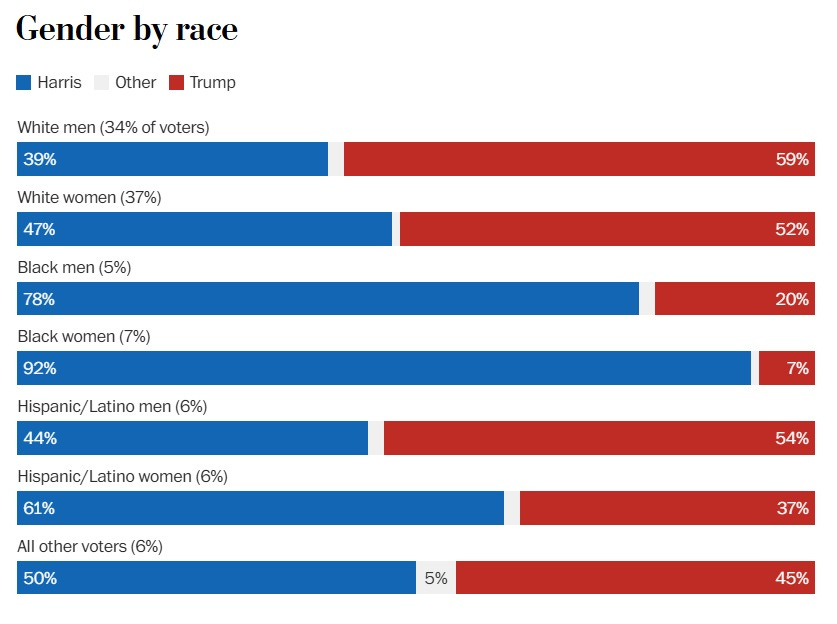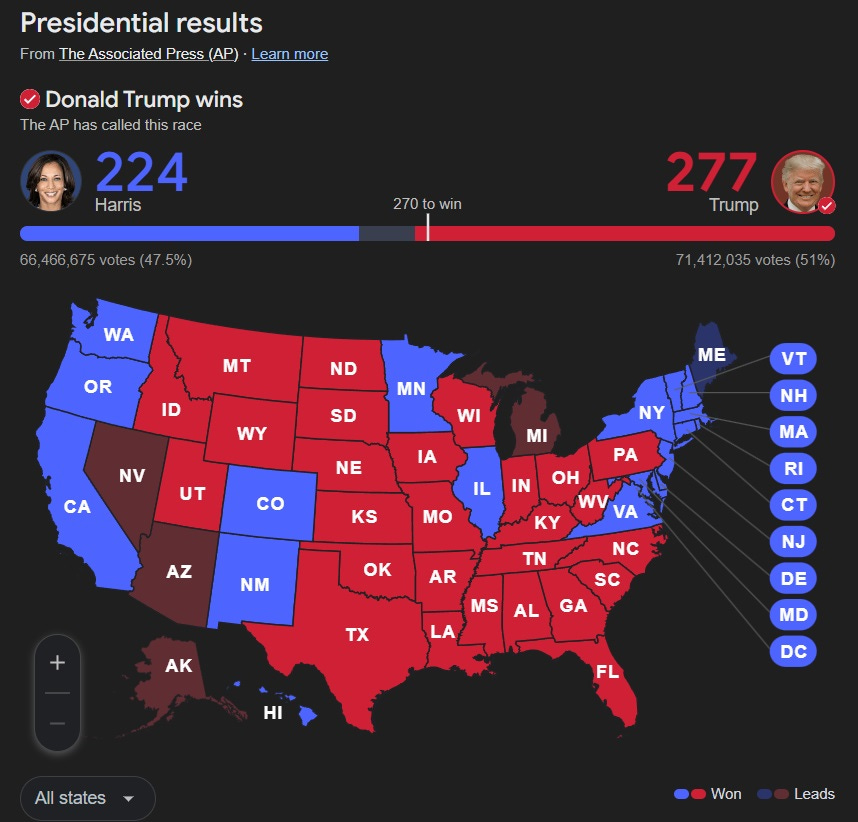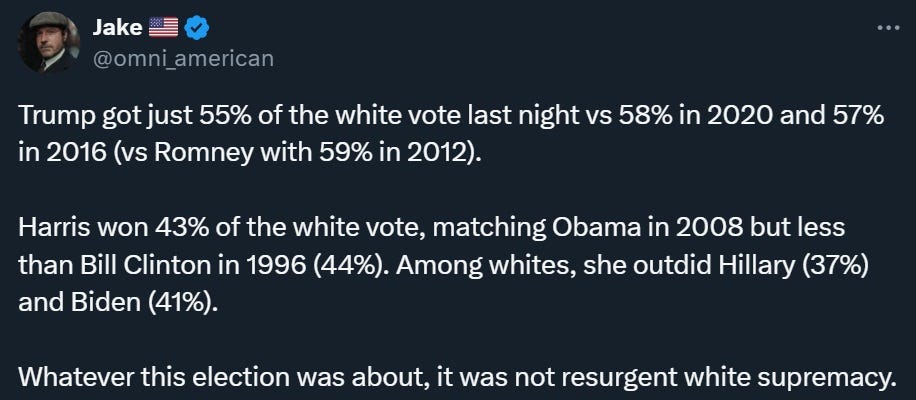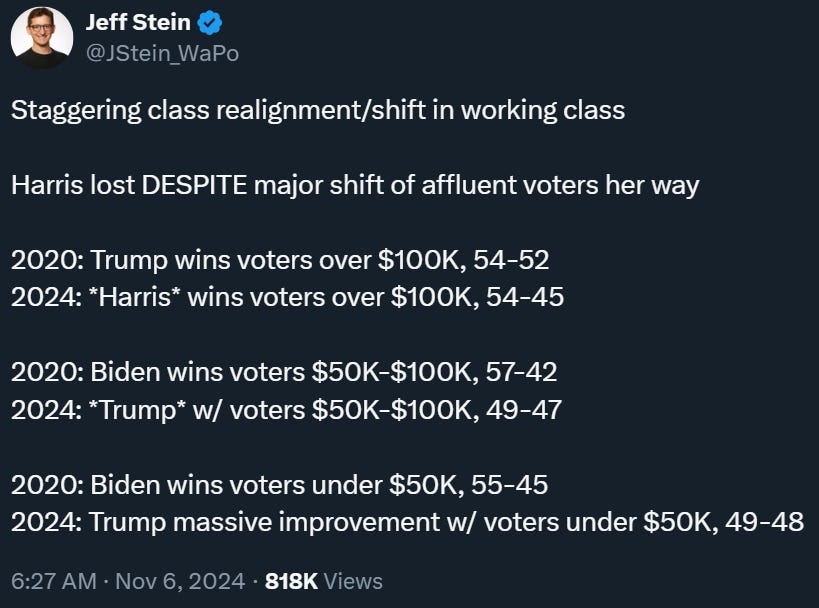Identity politics isn't working
Lesson #1 from Trump's victory.
Well, that obviously didn’t go the way I would prefer.
I’ve made no secret of the fact that I think Trump is a terrible choice for America, but there’s no denying that the American people have made their choice. Trump is currently projected to win every single swing state. He outperformed his 2020 performance in every single county in the country. He’s projected to win a solid majority of the popular vote — the first time a Republican has done so since 2004. I still don’t like the Electoral College as an institution, but you can’t blame it for this result like you could for 2016. In fact, Trump’s victory was part of a more general Republican landslide — the GOP took the Senate and improved its majority in the House. A map of political shifts between 2020 and 2024 shows almost solid red.
I suppose a small silver lining here is that we won’t have to spend the next two months enduring waves of “Stop the Steal” election denials, lawsuits, and threats to repeat January 6th. Democracy delivered Trump a victory, and so Trump has little incentive to attack democracy.
In fact, that silver lining might extend to the long term too. Trump and the GOP won because nonwhite voters and working-class voters — traditional Democratic constituencies — shifted his way. Dems still won Hispanic, Black, and Asian voters overall, but their margins fell significantly from previous elections, while actually improving with White voters:
In fact, exit polls show Trump winning a solid majority of Hispanic men!

Update: Over at Matt Yglesias’ blog, Jed Kolko shows that heavily Hispanic areas swung harder toward Trump than any other parts of the country:

Ronald Reagan’s prophecy that Latinos would become Republicans is coming to pass.
Income has realigned as well. Democrats are now the party of the educated upper middle and wealthy class, but have lost their appeal to the middle and working classes:
This largely destroys the narrative that nonwhite immigration will demographically drown White Americans under a tide of imported minority votes. In fact, it vindicates my guest poster Wally Nowinski, who observed that high-turnout elections like this one now help Republicans, because marginal voters — working-class Americans and Hispanic Americans — now lean to the right:
At some point, Republicans are going to realize this, and hopefully become less anxious about America’s racial future. Hopefully they will also realize that any attempt to make voting harder actually hurts them in the future, because the impact would fall disproportionately on their own base.
I expect these realizations to take some time to sink in, but ultimately their effect could be very salutary for American democracy. In the days of Nixon and Reagan, Republicans never worried about democracy itself — it was obviously on their side. Even in 2004, Republicans could tell themselves that we lived in a “center-right nation”. Now, Trump’s victory, powered by lower-income Americans and Hispanic men, will hopefully convince the GOP that democracy is still a game they can win.
A democracy needs both major parties to believe they can win via persuasion rather than by organized resistance, and 2024 showed that Republicans can still do that — even if the method of persuasion is one that I personally wish hadn’t worked so well.
If you want an optimistic take, there it is.
So what other important lessons can we learn from this disappointing election result? I didn’t title this post “Why Trump won”, because I don’t think I really have a convincing answer — I’m not a political scientist, or even a political pundit. In fact, there are probably a bunch of reasons, not just one.
Nor am I going to be one of those pundits who tells you that if only Democrats had listened to my policy priorities, things would have gone very differently. In fact, few Americans care about my own policy priorities. My top issues are industrial policy and pro-democratic foreign policy. I definitely don’t think emphasizing those more, or doing more of those things, would have propelled Harris to victory. (I don’t think they would have hurt; I think voters just don’t care.)
But I do think there are some important lessons that we can already learn from this election, especially at the intersection of economics and politics. In particular, I see three big ones:
Identity politics — viewing racial groups as homogeneous “communities” to be targeted with appeals to collective grievances — is not an effective way of winning over Hispanic (or, probably, Asian) voters.
People care about inflation more than about unemployment.
The educated professional class has become dangerously out of touch with the rest of the country.
Instead of writing all of these in one post, I’m going to split it into three, because I think the lessons are each very important. Today, since I’ve already shown the racial and class breakdown of the exit polls, I’ll talk about how identity politics is failing Democrats. Whether or not you think identity politics drove voters into Trump’s arms, it certainly hasn’t done an effective job of retaining Hispanic voters. The whole approach needs a deep rethink.






